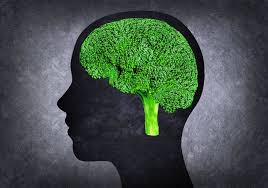Mental health with Nutrition
- Kuntal Patel (Nutritionist)

- May 9, 2020
- 4 min read
Updated: Nov 22, 2022
Date: 10th May 2020.
Sunday
Do you feel stressful life? Are you facing anxiety? The brain is functioning every second -for 24 hours every day.
As per the 2017 study, estimates that 792 million people lived with a mental health disorder. This ratio is slightly more than one in ten people globally (10.7%), in India as per the 2019 study, the daily ratio of depression is about 1,400.84. As per the average suicide rate of 10.9 for every lake person.
The purpose of this article, apart from professional intensional, wanted to spread awareness about mental health issues and their treatment. The reason is, I was phasing a server depression for the last two years. I recovered with the help of an expert clinical psychiatrist, friends, university support, meditation, exercises, and proper nutrition. If we try to maintain our mental and physical well-being, it helps us grow emotionally stronger. I knew about nutrition, so I can help myself to heal. Thus, this article is for those people who are suffering from depression and stop eating proper foods, hope it is useful for them.
Your brain needs food, modern food lifestyle makes a person follow the trend, and they prefer packaged foods, and processed foods. Your emotional well-being depends on what you eat. To correctly work, the brain needs proper nutrients in the required amount. Our human body functions working 24 hours a day and never stops. In today's competitive time, we need to be smart, productive, and kind of intelligent. To be perfect in all the factors needs a peaceful and healthy mind and a physically fit body. In terms of what we are getting, stress, the anxiety of failure, lack of sleep, and the most critical lack of time for cooking, we depend on packaged foods, ready-to-eat, and ready-to-cook foods.
Some facts on nutrition psychiatry studies:
1). Recent evidence has highlighted the role of the intestinal microbiome as a critical link between the gut and the development and function of the brain (Blasco et al., 2017; Dinan and Cryan, 2012; Dinan et al., 2015; Fernandez-Real et al., 2015; Sarkar et al., 2018).
2). Any effects of nutritional intervention during the period of early brain growth (the so-called first 1000 days, e.g. From conception until 2 years of age may have a most considerable impact on later health than interventions later in life.
3). Although all nutrients are necessary for brain growth, essential nutrients that support neurodevelopment include protein, iron, choline, folate, iodine, vitamins A, D, B6, and B12, and long-chain polyunsaturated fatty acids (Georgieff et al., 2018).
4). The vital role of a balanced diet in providing an adequate nutrient supply to support brain development for later cognitive function and the relevance of early life developed in the vulnerability for (later) psychiatric disease.
5). The link is most influential for vitamin B12 (its deficiency causes fatigue, lethargy, depression, and poor memory and is associated with mania and psychosis) (Smith et al., 2018; Tangney et al., 2011),
6). Other examinations have thought about "customary" slims down, similar to the Mediterranean eating routine and the conventional Japanese eating regimen, to an average "Western" consume fewer calories and have demonstrated that the danger of sadness is 25% to 35% lower in the individuals who eat a customary eating routine. Researchers represent this distinction because these current weight control plans will, in general, is high in vegetables, natural products, natural grains, and fish and fish, and contain just unobtrusive measures of lean meats and dairy.
Also, a significant number of these natural nourishments are aged, and in this way, go about as regular probiotics.
Aging uses microorganisms and yeast to change over sugar in nourishment to carbon dioxide, liquor, and lactic corrosive. It is utilized to shield nourishment from ruining and can include a lovely taste and surface.
7). These great microscopic organisms not just impact what your gut processes and ingests, yet they additionally influence the level of irritation all through your body, just as your temperament and vitality level, are picking up footing among scientists. The outcomes so far have been very astounding.
See when you try different things with nourishments how you feel, not just today, following day too.
Some easy nutritional tips:
· Eat entire nourishments and stay away from bundled or prepared food sources
• Consider eating an orange instead of drinking squeezed orange to maintain a strategic distance from included sugars
• Rather than vegetable juice, think about expanding your day-by-day servings of foods grown from the ground
• Incorporate probiotic-rich nourishments, for example, yogurt (keep away from organic product-based yogurt, which is high in undesirable sugars)
• Eat nourishments wealthy in fiber
• Supplant sweet treats with a serving of new products of the soil chocolate
• Stay away from handled and bundled nourishments that are high in nourishment-added substances that upset the sound microbes in the gut.
"Perfect" practice is — that implies removing every single prepared nourishment and sugar. Include matured nourishments like miso, sauerkraut, pickles, or fermented tea. Traditional food knowledge is the best way to heal your mental health issues.
With nutrition, Yoga, Deep breathing daily practices, and daily 3-40 minutes of physical activities. Also, enhance the significant changes in the condition.
Lastly, I would suggest that, with experiments with foods, try to observe your emotions and how you feel. At that point, gradually bring nourishment once more into your eating routine, individually, and perceive how you feel.
To sum up, with Brain required food, and to deal with mental health, proper nutrition with traditional wisdom and yoga are the best strategies. Better than anti-depression medicines. These medicines are having side effects on extended run usage.
(Note: consult an expert if a person is suffering from severe depression.)
Kuntal Patel
M/S Nutritionist/Dietitian
Founder of “Samskara-Nutrition counseling
References:
Fleming, Amy. "Nutritional Psychiatry: Can You Eat Yourself Happier?" The Guardian, 18 Mar. 2019, www.theguardian.com/food/2019/mar/18/can-you-eat-yourself-happier-nutritional-psychiatry-mental-health.
Koh, Hannah. "Nutritional Psychiatry: Your Brain on Food." Newtopia., 14 July 2019, www.newtopia.com/lifestyle/nutritional-psychiatry-your-brain-on-food.
"Nutritional Psychiatry: The Gut-Brain Connection." Psychiatric Times, Umadevi Naidoo, MD, www.psychiatrictimes.com/depression/nutritional-psychiatry-gut-brain-connection/page/0/2. Accessed 10 May 2020.
"Nutritional Psychiatry: Towards Improving Mental Health by What You Eat." ScienceDirect, 1 Dec. 2019, www.sciencedirect.com/science/article/pii/S0924977X19317237.
Ritchie, Hannah. "Mental Health." Our World in Data, 20 Jan. 2018, ourworldindata.org/mental health.
Selhub, Eva, MD. "Nutritional Psychiatry: Your Brain on Food." Harvard Health Blog, 31 Mar. 2020, www.health.harvard.edu/blog/nutritional-psychiatry-your-brain-on-food-201511168626.











Comments